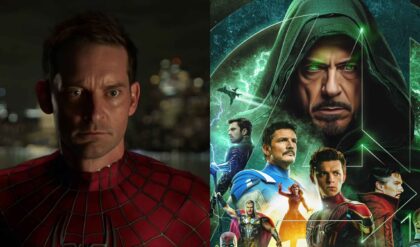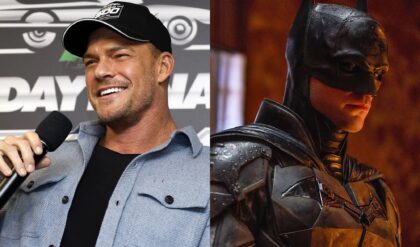In the smog-choked sprawl of Los Angeles, where the ghosts of unsolved murders whisper from every alleyway and the LAPD’s badge gleams like fool’s gold under flickering sodium lights, a new guardian of the forgotten has emerged. She’s not the grizzled veteran we’ve mourned since Bosch: Legacy wrapped its final bow in April 2025—no, this is Detective Renée Ballard, a force of nature with a Hawaiian grit and a Hawaiian fire that burns hotter than the Santa Ana winds. Ballard, the electrifying Prime Video spinoff that dropped all 10 episodes on July 9, 2025, isn’t just extending the Michael Connelly universe—it’s exploding it wide open. Boasting a pristine 100% Rotten Tomatoes score from critics who hail it as “the sharpest procedural blade in years,” the series has fans in a frenzy, declaring it eclipses even the iconic original Bosch. And at its scorching core? A crossover alliance between Ballard’s bloodthirsty lead, played with feral intensity by Maggie Q, and the legendary Harry Bosch himself (Titus Welliver, reprising his soul-deep role). This isn’t a gentle handoff; it’s a powder keg partnership, where a relentless new detective drags the old warhorse back into the fray for cases that claw at the soul. If Bosch was the bluesy heartbeat of L.A. noir, Ballard is the thrash-metal sequel—faster, fiercer, and unapologetically female-led. Buckle up: in a streaming sea of recycled reboots, this thriller is the fresh kill you didn’t know you were hunting.
To feel the seismic jolt of Ballard, you first have to wade through the legacy it’s both honoring and shattering. The Bosch franchise kicked off in 2014 on Prime Video (then Amazon Prime), adapting Connelly’s bestselling novels into a seven-season masterclass in grounded grit. Titus Welliver’s Harry Bosch was the North Star: a jazz-loving, rule-bending homicide detective orphaned by his prostitute mother’s unsolved murder, forever chasing “the truth at any cost.” With a mantra of “Everybody counts or nobody counts,” Bosch prowled Hollywood Division like a lone wolf, unraveling conspiracies that snaked from skid row to City Hall. The show was a slow-burn symphony—procedural precision laced with philosophical heft, exploring corruption, redemption, and the city’s racial fault lines. Critics adored it (97% on Rotten Tomatoes overall), and fans devoured the rain-slicked stakeouts and late-night scotch sessions. By 2021, after a finale that left Bosch hanging up his badge, the hunger for more was palpable.
Enter Bosch: Legacy in 2022, shifting gears to private investigation and family drama. Welliver’s Bosch teamed with his half-brother Mickey Haller (the Lincoln Lawyer) and daughter Maddie (Madison Lintz), trading LAPD bullpens for freelance shadows. Three seasons of escalating stakes—wrongful convictions, cartel incursions, personal vendettas—culminated in a 2025 swan song that teed up the future. But as Legacy bowed out with an 88% audience score (down from its predecessors’ perfection), whispers grew: was the flame flickering? Enter Ballard, Connelly’s 2017-born heroine from The Late Show, a character he’d been grooming as Bosch’s heir. Introduced in Legacy‘s finale as a midnight-shift wildcard aiding Bosch on a grisly cold case, Ballard wasn’t a sidekick—she was the spark. Connelly, ever the architect, scripted her as a foil: younger, brasher, unscarred by Bosch’s Vietnam ghosts but haunted by her own Maui-to-L.A. transplant trauma. The spinoff greenlit in late 2023, production rolling in July 2024, promised not a pale echo but a thunderclap evolution. And damn if it didn’t deliver.
Ballard thrusts us into the bowels of the LAPD’s Robbery-Homicide Division, where Renée Ballard (Maggie Q, channeling the quiet storm of her Nikita days into something rawer) inherits a cold case unit that’s less division, more dumping ground. Tucked in a fluorescent-lit basement with leaky pipes and dusty file cabinets groaning under 10,000 unsolved homicides—the largest caseload in the country—it’s a political exile for “troublesome” cops like her. Brass sees Ballard as a problem: a former beach patrol officer from Hawaii, ousted after accusing a superior of assault, now “kept quiet” by babysitting the dead. But Ballard? She’s out for blood. With empathy as her scalpel and determination as her hammer, she assembles a ragtag volunteer squad: retired detective Thomas Laffont (John Carroll Lynch, all avuncular menace from Fargo), who’s un-retired and itching for one last hunt; reserve officer Ted Rawls (Michael Mosley, Ozark‘s brooding fixer), grudgingly assigned to spy on her; eccentric volunteer Colleen Hatteras (Rebecca Field, Surface‘s quirky depth), whose “intuitions” border on clairvoyance; sharp legal intern Martina Castro (Victoria Moroles, Teen Wolf‘s fierce survivor); ex-cop Samira Parker (Courtney Taylor, Abbott Elementary‘s understated steel), lured back by Ballard’s siren call; and the indomitable Tutu (Amy Hill, Magnum P.I.‘s comic firebrand), Ballard’s grandma dishing wisdom and poi from the sidelines.
The season ignites with a shotgun-toting foot chase through Koreatown’s neon underbelly, Ballard clocking a suspect like a prizefighter. From there, it’s a relentless cascade: a politician’s sister’s decades-old strangling unearths a serial predator’s trail; a Hollywood producer’s “suicide” unravels into a web of elite cover-ups; a Jane Doe from the ’90s riots exposes departmental rot tied to the Rodney King fallout. Showrunners Michael Alaimo and Kendall Sherwood (veterans of Bosch‘s writers’ room) weave Connelly’s DNA—The Late Show‘s midnight mayhem, Desert Star‘s drought-fueled desperation—into a tapestry that’s equal parts puzzle and powder keg. But the true voltage surges when Bosch crashes the party. Welliver’s guest arc isn’t nostalgia porn; it’s nitro. In episodes 4 and 8, the grizzled PI mentors Ballard on a case linking her cold files to his old nemeses—corrupt brass, shadowy fixers, a conspiracy that could torch the department. Their dynamic? Electric friction: Bosch’s methodical blues clashing with Ballard’s surf-rock urgency. “You’re like a hurricane in a teacup,” he growls during a stakeout; she fires back, “And you’re the eye—calm till the storm hits.” It’s paternal without patronizing, a baton pass where the elder yields ground to the inferno.
Maggie Q doesn’t just star; she seizes the franchise like a riptide. At 46, the Hawaii native (born Margaret Quanit) infuses Ballard with lived-in layers: the coiled grace of a surfer reading waves, the quiet fury of a survivor who’s stared down predators. Q’s been grinding since Mission: Impossible III‘s sidelined assassin, but Ballard unleashes her—vulnerable in therapy flashbacks to her assault, ferocious in interrogations where her eyes turn to obsidian. “Renée’s not broken; she’s unbreakable,” Q told EW in a May sit-down, crediting Connelly’s notes on Ballard’s Hawaiian roots for grounding her performance. Welliver matches her beat for beat, his Bosch softer around the edges post-retirement but no less lethal, nursing black coffee and grudges in equal measure. The ensemble crackles: Lynch’s Laffont as the wise-cracking uncle with skeletons; Mosley’s Rawls evolving from skeptic to soldier; Taylor’s Parker mirroring Ballard’s redemption arc with street-smart swagger. Even Hill’s Tutu steals scenes, her ukulele-strummed pep talks a balm amid the brutality.
Visually, Ballard is L.A. porn dialed to 11. Cinematographer Renaud Gallet (Bosch‘s rain maestro) floods the screen with the city’s bipolar soul: sun-blasted beaches bleeding into fog-choked freeways, basement fluorescents flickering like dying stars. Jet Wilkinson directs the pilot and finale, infusing chases with Heat-level choreography—tires screeching on Mulholland, shadows swallowing suspects in Echo Park. The score, by the franchise’s go-to Mark Isham, swaps Bosch’s sax solos for electric ukulele riffs underscoring Ballard’s island grit. Production, shot on location from July to November 2024, captured the drought’s bite—cracked reservoirs mirroring the unit’s parched budget—and the riots’ echo, with extras channeling 2020’s unrest for authenticity. It’s not glossy; it’s visceral, the kind of show that leaves you smelling cordite and tasting salt.
The shockwave hit July 9: all episodes unlocked, and Ballard rocketed to Prime Video’s No. 1 spot, dethroning The Boys spin-offs and charting in 85 countries. Critics? Ecstatic. Variety’s Caroline Framke dubbed it “a superb evolution, with Q’s heat thawing cold cases into infernos.” The Hollywood Reporter praised its “unflinching dive into LAPD’s underbelly, outpacing Legacy’s fatigue.” TechRadar crowed, “Prime got Legacy wrong—this rights the ship, 100% proof.” That Tomatometer perfection (from 22 reviews as of November) isn’t fluff; it’s earned, surpassing Bosch‘s debut-season dip and matching Legacy‘s peaks. Audience scores hover at 78% Popcornmeter—solid, if tempered by die-hards missing Bosch’s baritone narration—but forums explode with converts: “Better than original? Hell yes—Ballard’s got fire Legacy lost,” posts one Reddit thread with 5K upvotes. X (Twitter) lit up post-premiere: “#BallardOnPrime is Bosch on steroids—Maggie Q OWNS this,” raved @CrimeFanatic87, clip of her takedown going viral (2M views). Fan edits mash Bosch-Ballard banter into supercuts, while AO3 floods with crossover fic imagining deeper alliances. Even Connelly beamed on his site: “Q embodies Renée’s spirit—grateful fans see the torch lit brighter.”
What sets Ballard ablaze isn’t just the procedural polish—though the twists land like gut punches, from a mid-season reveal tying cases to a ring of dirty cops—but its timely thunder. In a post-2020 reckoning, it spotlights institutional sexism (Ballard’s assault arc echoes real LAPD scandals), racial inequities in cold case prioritization, and the empathy gap in policing. Ballard’s unit isn’t a superhero squad; it’s a mirror to underfunded realities, volunteers scraping by on passion and ramen. Her bond with Bosch? A masterstroke, blending mentorship with mutual rescue— he teaches patience, she reignites his fire. October 6 brought renewal news: Season 2 greenlit, pulling from The Waiting (2024), promising deeper dives into Ballard’s family ghosts and a Bosch-heavy arc. As November chills settle, with holiday binges looming, Ballard isn’t fading—it’s surging, 11.2 million views in Week 1 alone.
Four months post-drop, the verdict’s in: Ballard isn’t a side quest; it’s the main event. Fans who griped Legacy “ran on fumes” now chant, “Q > Welliver—who knew?” It’s bolder, brasher, a thriller that honors the old guard while unleashing the new. In Connelly’s ever-expanding “verse” (hello, Mickey Haller teases), Ballard stands tallest—proof that legacies aren’t buried; they’re reloaded. Stream it on Prime Video, pour a scotch, and let Maggie Q drag you into the dark. The cases are cold, but the hunt? It’s red-hot. Who’s ready for blood?





